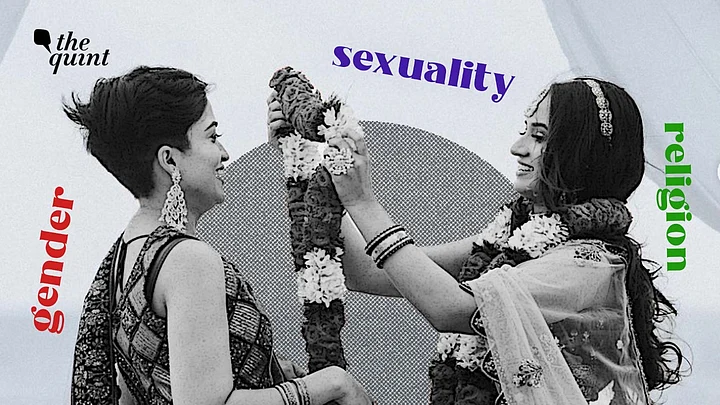Adorable pictures of Adhila Nasarin and Fathima Noora, the queer couple who broke out of the shackles of social inhibitions to fight conversion therapy, are being shared widely on social media. In the photographs, the women are seen wearing lehengas and exchanging garlands.
It has been over four months since the Kerala High Court allowed the lesbian couple based in Kerala to live together. After Noora was allegedly abducted by her own family, Nasarin filed a habeas corpus petition before the court. However, even today, they are living in the fear of being abducted by their own families, they tell The Quint.
“We have not been in touch with our families. They were mostly quiet for two months. They may even give us a year’s time. But after that, they won't let us live in peace. We are always living in the haunting fear of being kidnapped by our families.”Fathima Noora
The Quint spoke to the couple to find out how their lives have changed since the judgment.
Fearing Their Families, They've Kept Their Location Discreet
Nasarin (22) and Noora (23) met during their school days in Saudi Arabia and fell in love. When they apprised their parents of their love, they faced severe opposition. However, they continued their relationship.
After a while, the two returned to Kerala and their love story continued.
In May this year, when the couple came out to their parents once again, they were separated and “emotionally blackmailed," their close friend said. Noora was even forced to see a counsellor for conversion therapy, which is an unscientific practice where sexual minorities are forced to adopt the heterosexual way of life.
Following the judgment, the couple who recently completed their under graduate education started working and are living together.
Fearing their families, the couple refused to disclose the city they were residing in and also the names of their friends and well-wishers.
The couple had hoped that their time away from families would change attitude towards them. But they were wrong.
“My mother's sister reached out to me recently. She started off by saying she is glad we are happy together. Then she said that I should have informed them the moment the symptoms (of homosexuality) became more prominent. She was being sweet only to trap me in her fake kindness. She shrewdly wanted to know where I am living.”Adhila Nasarin
'Wearing a Hijab or Shunning Headscarf Is My Personal Choice'
Being open about their sexual identity has not made life easy for the couple. Hailing from two upper middleclass NRI Muslim families in Kerala, the couple received several hate comments targeting them for their sexuality and religious preferences.
Nasarin said, "Many have commented that, just by cutting my hair I can't be a man, implying that I am trying to become masculine. But that's not why I cut my hair. I do it because I like it this way.”
They have received several messages on social media, accusing them of “failing their religion” by not wearing hijab.
“Many are asking me why I don't wear the hijab anymore. It is my personal choice to wear it or not. For the first time in my life, I have the choice to lead my life the way I want to. I never had this freedom back at home.”Fathima Noora
Nasarin added, "In my home, my wedding was already planned without even caring to ask for my consent; and so today, it is beautiful to live life independently."
Being an Inspiration to Strangers Has Helped Them Fight Taboo
Despite all the alleged hate messages, the couple said they have no taboo or fear in admitting their relationship, and are in fact many people have started accepting them.
"We have struggled so much that we are adamant to live life happily, despite all odds. We want to build a home together, despite being suppressed for our clothes, sexuality, and religion."Fathima Noora
They have received a plethora of kind messages from strangers online and in real life, they said.
“So many people told us that we have become their inspiration, their role models. A few women said they are still living a life they dislike because they don't have the bravery that we have,” said Noora.
"We have been approached by strangers in public places, and always wonder initially whether they are there to scream at us. But actually people come forward just to take a selfie and wish us a good life,” Nasarin said.
"What is love to you?" I asked.
Nasarin replied, “Being together in sadness and joy is love."
Noora said, “Even in the worst times, we have the same vibe and that's what makes us value our love so much.”
(At The Quint, we question everything. Play an active role in shaping our journalism by becoming a member today.)
